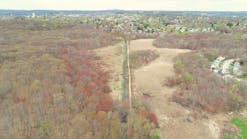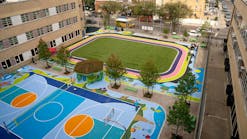The National Water Research Institute (NWRI) announced that environmental engineer Pedro J.J. Alvarez, Ph.D., P.E., DEE, the George R. Brown Professor of Engineering at Rice University in Houston, Texas, is the 19th recipient of the NWRI Athalie Richardson Irvine Clarke Prize for excellence in water research.
Alvarez was selected as the 2012 recipient because of global leadership and contributions to enhancing water resource sustainability through water pollution control. With a focus on examining new technologies, his work has provided fundamental insight on a broad range of water industry challenges, but he is best known for his pioneering research in two fields: bioremediation and environmental nanotechnology.
Consisting of a medallion and $50,000 award, the Clarke Prize is given out each year to recognize research accomplishments that solve real-world water problems and to highlight the importance and need to continue funding this type of research.
“The Clarke Prize is one of the greatest honors I have received in my life, an honor that I owe to the privilege of having had great mentors, students, and other intellectual sparring partners and collaborators, as well as a very supportive family,” said Alvarez. “This prize is an inspiration for generosity, integrity and world affirmation—the idea that the world can be a better place and we can do something about it by contributing to broader access to safe and affordable water.”
Alvarez began his career in the mid-1980s, working on a U.S. Congress directive to evaluate environmental impacts associated with the deployment of intercontinental ballistic missiles. This experience, which focused on assessing water supplies and treatment infrastructure at U.S. Air Force bases, inspired his passion to apply science, technology and policy to protect water resources.
He moved on to earn his Ph.D. at the University of Michigan, which is where he first began to make advancements in understanding the practice of bioremediation, a water treatment process that involves using microorganisms, such as bacteria, to remove (by consuming or breaking apart) contaminants from water supplies. Among its advantages, bioremediation can take place underground, avoiding the cost and effort of pumping groundwater to the surface for treatment.
Alvarez’s initial research focused on remediating groundwater aquifers impacted by hydrocarbons, organic compounds that naturally occur in oil. Fellowships and awards followed, as well as expanded research. Today, he is the author of two textbooks on bioremediation in soil and water (including the only one written in Spanish). The oil and gas company BP recently used his research to develop hydrogeology models to evaluate potential groundwater impacts from different types of biofuel blends.
Taking an interdisciplinary approach to remediation technologies, Alvarez later pioneered research on groundwater impacts associated with ethanol fuel releases, resulting in the development of guidelines for many states and the U.S. Environmental Protection Agency on the remediation and natural attenuation of groundwater impacted by leaking underground storage tanks.
He has also made significant findings in the area of phytoremediation (which uses plants to remove contaminants), such as discovering that trichloroethene (TCE), a chemical found in industrial solvents, can be taken up and transformed by plants irrigated with contaminated water.
His work has earned him numerous awards from groups in both the U.S. and Latin America.
In addition to his many outstanding research contributions, Alvarez stands apart in his field due to his significant outreach efforts to foreign researchers and students. From teaching as an honorary professor at Nankai University in China to serving as an advisor to two Presidents of Nicaragua on issues such as protecting the largest lake in Central America, he has contributed to the mentoring and development of researchers in the water industry all around the world. He is also the primary advisor to one of the most active student chapters of Engineers Without Borders, completing water supply development projects in countries like Honduras and El Salvador.
Established in 1993 in honor of NWRI’s co-founder, the late Athalie Richardson Irvine Clarke, the Clarke Prize is one of only a dozen water prizes awarded worldwide and has been distinguished by the International Congress of Distinguished Awards as one of the most prestigious awards in the world.





